Custom wood bats offer players the ability to tailor their equipment to specific preferences in weight, length, and material. They provide improved performance and comfort by matching the bat exactly to a player’s needs. This level of customization can affect swing speed, control, and overall effectiveness at the plate.
Choosing the right wood type and design can make a significant difference in durability and feel. Many players prefer custom wood bats because they combine traditional craftsmanship with modern specifications, ensuring consistent quality.
Understanding how custom wood bats are made and what options are available helps players make informed decisions. This knowledge can lead to better selection and improved results in the game.
Custom Wood Bats Features and Options
Custom wood bats come with various features that influence performance and comfort. The main factors include the type of wood used, size and weight adjustments, grip and finish selections, and the possibility of personal customization.
Wood Types and Their Benefits
The most common woods for custom bats are maple, ash, and birch.
Maple offers a hard, dense grain which provides durability and a solid hitting surface. It’s heavier but favored by players who want power.
Ash is lighter with a more flexible grain, allowing for quicker bat speed and better shock absorption. It’s easier to control but less dense than maple.
Birch combines traits of both maple and ash. It’s hard like maple but has the flexibility of ash, offering a balanced performance with moderate weight and durability.
Size and Weight Customization
Bat length typically ranges from 30 to 34 inches, with weight tailored to the player’s preference.
Custom options allow users to specify length, weight, and drop weight (length minus weight). For example, a 32-inch bat weighing 29 ounces has a drop weight of -3.
Players can choose a heavier bat for power or a lighter one for faster swings. Adjustments in taper and barrel size also affect handling and sweet spot location.
Grip and Finish Choices
Grip options include various tapes, knobs, and handle shapes to improve comfort and control.
Players may select from round or oval handles, and add cushioned or tacky tapes based on feel preference. Some grips absorb sweat better to reduce slippage.
Finish options range from natural varnish to satin or glossy coatings. These finishes protect the wood from moisture and damage while affecting the bat’s look and texture.
Engraving and Personalization
Engraving allows names, logos, numbers, or messages to be added to the bat.
Laser engraving and branding techniques create permanent marks on the barrel or handle. This adds a personal or team identity and can include custom artwork.
Options vary from simple text to detailed designs. Personalization enhances the bat’s uniqueness without altering its performance.
Ordering and Sourcing Custom Wood Bats
When ordering custom wood bats, buyers must consider quality, flexibility in design, and timing. It’s important to find skilled makers, understand the customization options, and know what to expect regarding delivery and costs.
Choosing Reputable Bat Makers
Reputable bat makers offer consistent quality and use premium wood such as maple, ash, or birch. Experienced craftsmen typically provide clear information about the sourcing of their wood and the manufacturing process.
Buyers should look for certifications or endorsements from baseball organizations. Customer reviews and portfolios displaying previous custom work can confirm a maker’s reliability and skill.
It is also important to verify the maker’s return policy and warranty. Trustworthy manufacturers stand behind their product performance and durability.
Online Customization and Purchase Process
Most custom bat makers now offer online interfaces to choose length, weight, wood type, handle style, and finish. Some sites include 3D previews or image uploads for personalized logos.
The process often starts with selecting a base model, then applying specific custom options. Clear instructions about measurements and preferences reduce errors and ensure satisfactory results.
Secure payment options and customer support availability improve the buying experience. Order confirmation usually includes lead time estimates and order summaries to avoid confusion.
Delivery, Lead Times, and Pricing
Lead times for custom wood bats typically range from 2 to 6 weeks, depending on demand and craftsmanship complexity. Rush orders may be available but usually cost extra.
Shipping costs vary by location and bat size but are generally stated upfront during checkout. Tracking information is standard for most orders.
Pricing depends on wood type, customization depth, and maker reputation. Maple bats tend to be pricier than ash or birch. Custom graphics or unique finishes add to the cost.
